Recently, some game design unrelated research brought me to a certain concept I already knew. After some thinking I finally realized that this special concept is the missing puzzle piece to explain a great game design feature of a game I am very fond of.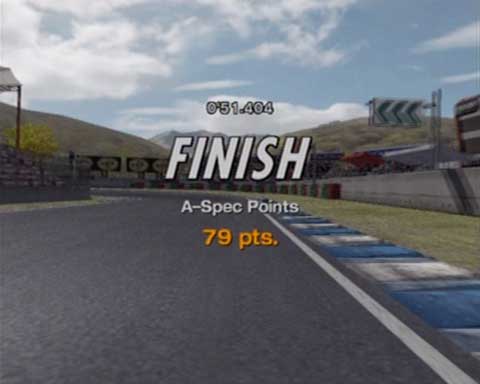
“Yay, I won! I am the best! But…wait a minute, what are those A-Spec points?”
The game is Gran Turismo 4 and I really think it is one of the masterpieces of game design. The game design feature I want to talk about are the A-Spec Points and how they motivate the player without limiting him. The concept, which explains the phenomenon is Cognitive Dissonance.
The Gran Turismo series has been around for some time. Until Gran Turismo 4, it’s main mode, the career mode suffered from the same problem as every career mode does – it did not deliver the kind of freedom it seemed to offer. Players could choose freely among lots of cars. Some of those cars were obviously slower then others. Players had no reason to choose slower cars so they became redundant. The freedom was an illusion.
There has been already obvious solutions: you can design special races, where only slower cars are allowed. However, even then players will choose the best car of the permitted ones so you might just as well allow only that particular car. Again, freedom of choice is restricted.
Another solution is to give the player a slow car at the beginning and introduce faster cars only gradually as a reward. Burnout does that, for example. This is nice because it creates some motivation. However, this strategy also restricts freedom of choice. Additionally, it is especially frustrating because players buy a racing game to drive fast cars but have to painfully work to get to the hot wheels. This, in turn can be moderated a bit by trimming off the very slow cars and starting with already some light sport cars. Project Gotham Racing 3 does that – the slowest car in this game is a Nissan Skyline. However doing that, you again restrict the number of available cars. It is important that Gran Turismo also offers the very mundane, everyday cars. Sometimes, I enjoy taking some car I have driven in real life for a spin.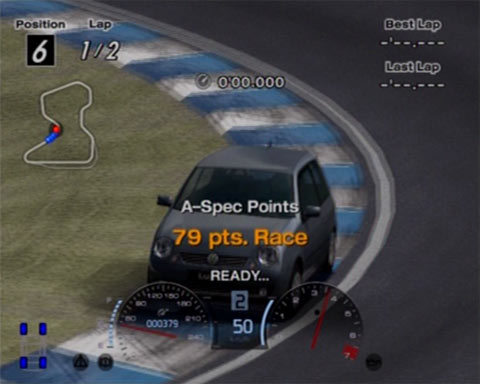
My girlfirend’s car is a VW Lupo. She is madly in love with it and she enjoys driving it in Gran Turismo. I joined her because it also yields a fairy nice amount of A-Spec points.
Of course, you can also add a tuning system so slower cars can get faster and can keep up with faster cars. Enthusia even made that tuning a reward so your car can “gain experience points”. That was creative but didn’t help. With tuning, you just get fast cars, which look like slow cars.
So how do you create a system, where players will feel motivated to do both: drive fast cars and drive slow cars. Gran Turismo 4 introduced a system which does a very good job at exactly that without putting ANY kind of restrictions upon the player. It is simple, too! Apart from which place you finish, your performance is being rewarded by the so-called A-Spec points if you win. You can get anything between 0 to 200 points. It all depends on how fast your car is when compared to the other cars. You can always see how much the race is “worth” at the beginning of a race so you can quickly quit and switch to a slower car if you are not satisfied with the A-Spec points you might receive. The clue is that those points… do absolutely noting. They are completely and utterly useless. You won’t need them an any point in the game, you cannot buy or unlock anything with them. They even don’t add to your “percentage of the game completed” rating, they are just there. Also, they are called points but they aren’t really. You see, when you redo a race, you will only get more points if you perform better then the last time. Even then, you will only get the difference. So the maximum, total points you will ever get from a particular race is 200, no matter how often you repeat it. If you believe the Internet forums (because the game doesn’t tell you that) you can collect 111813 points in the game (some races yield less then 200 points, I don’t quite understand how). In a way, those are not points but a ranking system, which works backwards. It doesn’t tell you how far away you are from the best score but how far away you are from the worst score. The “first place” is the one with the highest number.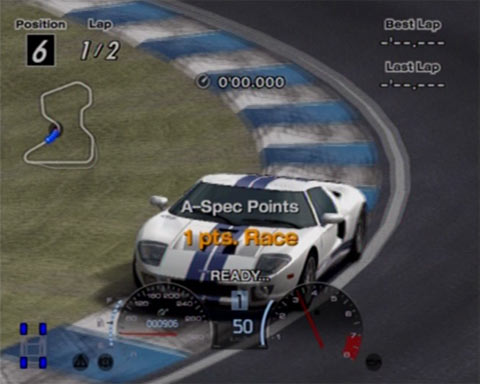
1 point – the solatium for using a Ford GT. Being able to drive a such a car is an important reason why people buy these games. Gran Turismo 4 does not take away that possibility but nudges the player into reevaluating the way they think about cars.
Gran Turismo 4 also keeps A-Spec points pretty low-profile, they aren’t even explained in the manual. No flashing, burning stars like in Burnout.
This system seems counter-intuitive. The player gets something but it seems like such a weak reward because it leads nowhere. Game designers always feel compelled to give the players as much reward as possible. This is a fallacy. Because of the wonders of Cognitive Dissonance, lower rewards sometime yield better results.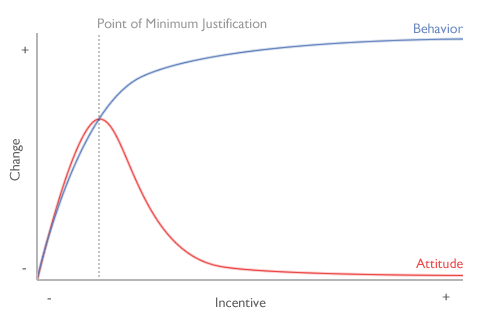
As the incentive rises, people are more inclined to change their behavior but they need to change also their attidute to justify it. From a certain point on, the incentive becomes so great that there is no need anymore to change the attitude.
Cognitive Dissonance is a state of mind, that occurs when two different cognitions occur at the same time. A good example is if you believe in something and suddenly find evidence it is not true. Your belief suddenly conflicts with the facts. This is highly undesirable and usually people have special strategies to deal with dissonance. In our example, you might reevaluate you belief or change it so it fits with the facts. Or you might challenge the validity of the facts or their significance. You might also ignore or change facts – with brute force if necessary.
An interesting thing occurs when people are tricked into a Cognitive Dissonance by being motivated into doing something they don’t want to do. In a famous experiment, people were paid to lie about how they felt about something. There were two test groups: one which received only a very small reward (1$) and one which received a big reward (20$). The interesting thing is that people from the 1$ group were more convincing. It subsequent tests, it seems like the 1$ group dealt with the dissonance by actually changing their attitude towards the thing they were supposed to lie about. This way, the lie was no lie after all. The 20$ group had a very good reason to explain the dissonance (”I did it for the money”) so there was no reason to change their attitude.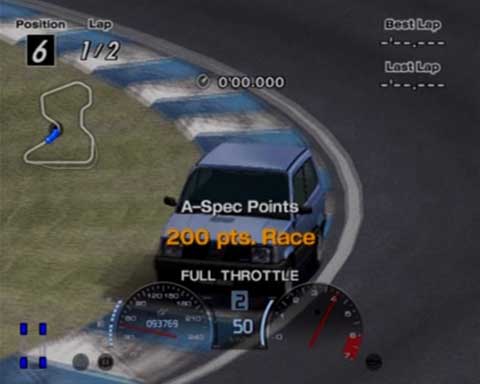
A-Spec point let you consider searching for a very weak car and tuning it just right so you can just barely win the race. The races are more challenging, more exciting and more fun… but you don’t have to do it!!
This is exactly how A-Spec points work. Players start off thinking faster cars are better. However, players receive a small reward by using slower cars. Players will then start subconsciously rethinking their attitude towards the weaker cars. Suddenly, using slower cars is somehow cool as well. It works only because A-Spec points are no big deal. If they were, players would feel “forced” to use the slower cars. They would complain how the game expect them to drive the cars they hate so much.
The system is extremely well balanced. Most of the time, 200 points are utterly impossible to reach. If players want to try collecting some points, they have to pick a lower goal they want to work towards. Also, as already mentioned, the thing can be compared to a ranking system but backwards. It shows how far you are from being “the last” which additionally weakens the reward. If it would show you how far away you are from being “the best”, it would represent a goal for the players. Instead, the system doesn’t provide players with clear goals, they have to evaluate for themselves how much effort they want to put into it.
Gran Turismo and Initial D share a very similar philosophy. No wonder the Gran Turismo drifting scene has a such strong affinity towards Initial D.
So Ironically, players are more happy when they receive a smaller reward. The beauty of it is that it doesn’t limit freedom of choice. In the contrary – it encourages actually to make use of the full potential of the system. Players will scour the vehicle list looking for the perfect car with the perfect tuning to get that A-Spec Score at least above 50. The keyword is “encourages”. You can still take that huge, tuned Viper and blow away the competition. But as a nice side-effect, A-Spec points also trick players into challenging the superficial dogma of “faster is better”. I found myself discovering a new world of where driving skill and diligence is more important then violence and horse power. In a way, they are the same thoughts Asian shows like Initial D propagate (as opposed to The Fast and the Furious). I’m reaching for the stars now but in a way, this little, inconspicuous feature teaches players to be better humans.






Thank you for that excellent article. It took me a while to fully understand the article, but I found it very informative and it explained some of my own habits in gaming.
While trying to fully grasp the concept, I came up with a few thoughts which may be interesting. To give some background info on myself; contemplating about these issues is for me a hobby. My current main occupation is studying Japanese and Korean (I’m Dutch, myself). Please comment on my thoughts and perhaps correct me where I’m wrong.
Reward in games can be a risky thing. I notice I often find myself playing a game without really enjoying it, but wanting to unlock the next thing. The problem is, that you play level A to unlock level B, NOT because you simply want to play level A. Then of course, you will want to unlock level C and then D etc. During this process, you are not actually enjoying the game, and after repeating this process a couple of times, subconsciously you decide the reward is not worth it since you are not enjoying yourself, and you stop playing the game.
You can’t however simply give up this system of unlocking the next level in a game, because it’s often tied to ramping difficulty and storyline. What a game needs on top of this system to become interesting is exactly what you are describing; something that a gamer will obsess about in the game’s gameplay mechanic, which is (at least partially) motived by himself and not the game (which is, from what I understand, Cognitive Dissonance).
The tricky part here is that this is quite tricky to achieve. Giving the gamer too little incentive, will just get him to ignore it, and giving too much incentive, will make it a chore.
An excellent example which, perhaps unknowingly, makes use of this theory, is the xbox 360 achievement point system. The way it works is that you get points for certain achievements in the game, but the points do nothing. You can earn up to 1000 points per game. This on it’s own is quite similar to the a-spec points example.
There is however an added element of motivation. The points show up online on your xbox live account. What changes, is that you not only get something trivial to obsess about, you also get to show it off to the rest of the gaming community. The point-gathering is still meaningless, but at least it doesn’t go unnoticed.
Before reading your article, I thought it was a bad decision by Microsoft to let those points go unrewarded, but doing that would make collecting points a chore.
Another great reason why this system works, is because it is implemented in every game. You get confronted with it time and time again, and if you are able to motivate yourself on just one game to collect all the points through cognitive dissonance, you will be using the same self-constructed reasoning for every other game.
In the case of achievement points, the developer is free to spread the 1000 points out in the game in whichever fashion they like. It’s common to award achievement points for unlocking things in the game. However, instead of tying points to unlockables, a better way, is to add them to gameplay elements that you wish for the gamer to spend time on. What’s especially dangerous, is if you award more points for unlocking something than for displaying skill in the game. This makes the points look worthless for anyone who doesn’t care for the points yet.
Even with having pre-established something that you want, like achievement points, you will still be motivating yourself on a case-by-case basis through cognitive dissonance. Using the a-spec example, you will never go for the near-impossible 200 points because with the amount of work it takes, you won’t be able to justify it. Having an unreachable limit is great to reach the full potential of cognitive dissonance, because it allows you to reach the limits of your self-constructed motivation.
One should wonder, where gameplay fits in with this theory. Gameplay is actually a determining factor to the limit of self-motivation. You want points, so you are looking to justify why your time spent on getting these points is worth it. This is where gameplay has to provide the answer. More skillful play should mean more points. Depending on the game this could be speed, damage taken, items collected, etc.
In short, I think that to get the most out of your game, you have to maximize the situations that allow for cognitive dissonance while tying this to as many gameplay elements as possible. Ideally, there should be a (near) unreachable limit to the amount of points, allowing the gamer to go as far as his interest in the gameplay can take him. Also, there should be one point system to tie every element together, so that there has to be only one moment of cognitive dissonance to generate interest in these points.
As I’m going to Korea for a small two weeks, it may take a while for me to reply again, but I definitely will check back. Thanks for reading, and please leave some comments! If my reasoning holds up, maybe after some editing it might be worthy as a blogpost?
Thank you for your comprehensive answer. I’m sorry I didn’t notice it earlier.
Basically, I would agree with almost everything you’ve mentioned. I didn’t know the XBox 360 Point System because I don’t own one but it seems to be quite comparable. Of course, as you’ve mentioned, being able to show off the points you’ve collected makes it a bit more potent reward then a-spec points. It is a very subtle balance you have to strike here.
And yes, the thing I didn’t mention here is that of course, you need to have a gameplay system which is deep enough to allow people to invest so much time in it. If it can be mastered easily, the whole process will run dry quickly. Gran Turismo is of course has a very complex driving simulation so it fits perfectly.
The only thing I would question is if this effect is really so desirable at times. As you put it:
“..you have to maximize the situations that allow for cognitive dissonance..”
I wouldn’t be sure about that. In the case of Gran Turismo it is a great tool to challenge traditional beliefs about fast cars and fully exploit the potential of the large ammount of avalible cars. However, I don’t think such a trick is always necessary. I think it really depends on the situation. So you should make sure you know exactly what you are trying to achieve before implementing such systems.
Interesting article, I didn’t quite get it at first, but when it clicked it did make a lot of sense. I know all too well the feeling of doing something in a game purely to get to the next part.
That said I don’t think its impossible to apply reward schemes that don’t force players to unlock. By making rewards only relevant to players that want them you can more safely reward players.
In Gran Turismo 4’s case you could make A-Spec points unlock slower cars, as those who drive for A-Spec points use slower cars and those who don’t like slower cars don’t care about A-spec points. By doing this you allow players interested in accumulating points to perpetuate it by rewarding with super-slow cars that maybe yield over 200 points for a perfect performance.
This does create an issue of balance however, while the slower cars are balanced within itself, there is no reward other than winning races to play with fast cars. While freedom is there, winning a race with the fastest car in the game has no lasting satisfaction. So while you won’t feel forced to use slower cars, you won’t feel any achievment for not using them so you might just go for the slower one anyway.
The simple displaying of 183 A-spec points on a given race is enough to make you remember how much you enjoyed that race, no such satisfaction exists for races with faster cars. Its easy to quantify A-spec points, not so for fast cars.
None of this is to say there couldn’t be some similar reward system for faster cars. I would think that by rewarding players with further play in the area of the game they’ve chosen to explore allows them to have a positive experience no matter how they play and because they get rewarded no matter what they do they may not feel compelled to explore all avenues of play out of duress. There is and always will be the completionist who will do everything in a game, but for the majority of gamers as long as they are playing, enjoying and getting positive feedback from the game however they choose to play it, I don’t see rewarding for everything is in any way inferior than rewarding for nothing.
As long as a game provides ample objectives in every area a player should be able to play a game as he wants and get continually rewarded.
Wow, thanks for the lengthy answer. I will do my best to address your concerns:
“That said I don’t think its impossible to apply reward schemes that don’t force players to unlock. By making rewards only relevant to players that want them you can more safely reward players.”
The thing is that I really question of rewards are really something you want. It is a knee-jerk reaction of game designers to add reward when they want to motivate players. I think this kind of game design creates the wrong kind of mentality among players. So the question is not how to “safely reward” players but how to motivate them without rewards.
“In Gran Turismo 4’s case you could make A-Spec points unlock slower cars, as those who drive for A-Spec points use slower cars and those who don’t like slower cars don’t care about A-spec points.”
This solution creates some of the problems I mentioned:
- You have to have LESS cars at the beginning of the game in oder to make them unlockable
- Players will collect A-Spec points just to be able to drive that Fiat Panda, not because they enjoy it
- The game will tell the players how much they need to “work” (”You need 300 more pints to unlock car XYZ”) whereas now, players have to find out themselves what is most fun for them
- You are also diving players into two groups: the A-Spec players and the other. Dividing players into groups never solves any problem, it just creates a self-fulfilling prophecy. That two groups might never existed in the first place but you force them into that decision and reinforce the segregation through rewards. After all Everybody’s Hardcore.
“The simple displaying of 183 A-spec points on a given race is enough to make you remember how much you enjoyed that race, no such satisfaction exists for races with faster cars. Its easy to quantify A-spec points, not so for fast cars.
If you really had fun while racing, displaying a number at the won’t change it. The reward should be the race itself, not some kind of rating. If you are having fun because of all those cool ratings you get, then you are doing it for the wrong reasons.
Also, races are already quite the quantification. So if you are first with a fast car, that’s already a very clear reward.
“I don’t see rewarding for everything is in any way inferior than rewarding for nothing.”
It is unintuitive but it’s true. If you are still not convinced, try this talk by Jonathan Blow.
I believe something similar occurs in Juiced, where you drive slow cars, tune them up a bit, and the reward lies in that they handle really well. Bear in mind this is a game supposed to remind you of Fast & Furious. Juiced II is more glossy somehow; fun but not quite as rewarding.
Hm, maybe I didn’t make myself quite clear.
First of all, the slow cars in GT4 are just that: slow. They also handle worse. Tuning them up will mostly get you a worse car than if you just took a fast car in the first place. It will also reduce the number of A-Spec Points. I haven’t played Juiced but from what you described, this isn’t like Juiced at all.
That the revolutionary thing about GT4 is that there is actually very little reward even for choosing a slow car. There is one but it’s very subtle. Surprisingly, that’s a good thing! Because it won’t force you to “grind” the slow cars against your will. It will also make you appriciate them more if you chose to drive them after all.
I admit that the point here is a bit obscure and counter-intuitive.
I enjoyed this article a lot and would like to chime in a bit about how this relates to my experiences with achievement points. (I don’t have a clear point in mind, so this might be somewhat of a ramble.)
I would like to attest to the psychological power of achievement points. I have been playing games on the 360 since it was fairly new, and I have to say that they have become such a large part of my gameplay experience that they feel painfully lacking when I play games on other platforms. (Steam achievements and playstation trophies don’t scratch the itch for me because they don’t have numbers! The whole point of achievements is the feeling of accumulation, which only truly matters because other people can see(!), which both other systems completely lack.
Besides the simple satisfaction of accumulating a (meaningless?) number, achievements have goaded me into interesting gameplay situations that I never would have taken part in without them.
The most notable example of this was oblivion. (All of this is going to be spoilery if you haven’t played Oblivion. All of the achievements in oblivion are attached to “ranking up” in the various factions of the game world. Now, if I had been left completely alone in oblivion, I wouldn’t have even known that these factions were anything more than minor sidequests, and in some cases I might not have even known they existed! You have to go through surprisingly elaborate and somewhat unintuitive methods to even gain entrance to some of the guilds. (I seem to remember spending around an hour trying to trail a paranoid halfling around a city, justifying the paranoia which caused me to trail him in the first place!) If I had been left to my own devices, I probably would have given up on the first guild when they told me I had to go across the entire world to another town to try to join in the first place.
Yet, if I had given up on all of those side quests, what ended up being a rich and fulfilling 70+ hour game would have been over in around 5 hours as a result of barreling through the uninspired and uninteresting main quest. Those guilds held pretty much every interesting and memorable moment I have of that entire game.
More importantly, Oblivion’s achievements also forced me to think more deeply about my character’s motivations. Left to my own devices in RPGS, I tend to play a rather strictly Lawful Good sort of character, a bit of mindless and cheerful wish fulfillment which can leave a game experience feeling a little bit shallow. However, a sizable chunk of the achievements involved infiltrating guilds of thieves and assassins.
Somewhere along the line, I forgot that I was infiltrating the various guilds because of achievement points, and I started to feel like I was doing it because that was what the character I was playing felt was necessary. I hit a point where I had to stop and examine my character’s recent actions and really think deeply about how the same character who had earlier been protecting people from bandits and picking flowers was now slipping people poisoned apples (you had to steal all the other food in their house too so they would eat the apple!) and slipping people enchanted hats that lit them on fire. (The “AAA DEATH HAT” was named as such because sleeping individuals put on clothes alphabetically when they woke up.)
I eventually realized it made sense as a story about an individual who had decided that the ends justify the means. This was someone who would be everything for everyone and do whatever it took to make the connections it would require to become truly powerful. She ended up taking control of the assassins guild and killing all of it’s members, being the leader of all of the other guilds, and becoming incredibly friendly with all of the rich, powerful, and royal individuals in the realm. This was an individual who could silence, bribe, blackmail, charm or eliminate anyone who acted in a way that she disagreed with. She became sort of a shadow empress, exerting her will upon the land; a magneto or a doctor doom sort of character.
This was cognitive dissonance at it’s most powerful! Not only did it change what I was doing as a player, it jarred me inextricably into immersion by making me feel like I had been self-motivated(!) to do things I normally would never have wanted to do.
Look at how far what I ended up with was from what would have happened! Instead of that rich and complex and memorable experience, I would have had a forgettable 5 hour campaign about a heroic knight who killeded some demon…monster…vampire…things and saved some boring rich dude who turned into a dragon or something. Yet, if I had wanted a short and shallow experience like that, nothing at all was forcing me to change my behavior.
That isn’t to say that achievements always have such a positive effect. I spent about 10 hours trying to complete a pile of insultingly badly tuned movement challenges in one of the spiderman games before giving up on the entire game in disgust. What would have been a somewhat satisfying junk food game became a hideously unsatisfying arcade stunt web swinging simulator thing. Ugh.